The Polish Wedding
A story of vodka and nóżki w galarecie
April 7th, 5:00 p.m. A new message in my mailbox. It’s Irene: “I’m gonna make an indecent proposal, a Polish friend invited me to her wedding. It will be epic. Two days, two parties, real Polish tradition, pure madness... you could make a movie out of it”. When a friend makes such a proposal, you can’t say no. I book the flight ticket, I pack up, I say goodbye to everyone as if it was the last time I’ll ever see them and I fly to Warsaw. I land in Modlin and on the shuttle bus I meet a guy from Turin, travelling with two friends. He has already been to Poland, in Krakow, and he decided to come back because here, he says, prices are moderate, people are welcoming and “girls are less snobby than in our country”. He wants to make clear that he doesn’t have a hidden agenda, and that his trip has nothing to do with those seedy Russian sex-tours. I don’t quite believe him. Upon his arrival at the station, he is already approaching the first Polish girl who got off the train.
After almost ending up one hundred kilometres far from Warsaw, changing the train twice and travelling for eight hours in total, I get to Łódź, the city where the bride is from and where Polanski studied film-making, in the Widzew station. I get off the train with around eighty other people, but the only sound I can hear, besides the whistle of the wind, is the wheels of my trolley resonating like pistol shots in the silent station. The atmosphere reminds me of the good old days of East Berlin. Irene comes to pick me up from the station, along with the future bride and groom, Anna and Pawel, and Kasia, whose family will host us during the days of the wedding. In the car the groom confesses his boundless love for the Italian language, and Irene and I find ourselves singing out the Italian national anthem, in the best World Cup spirit. Before getting home I have my first baffling revelation: Łódź, for weird and obscure phonetic rules, is pronounced wooch. I realize I made a fool of myself every time I talked about Polanski’s studies, or maybe I managed to get away with it.
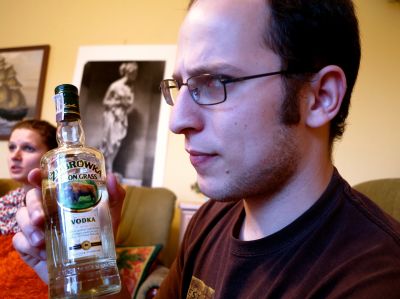 The national flag waves above the front door of the beautiful house with a garden in the countryside near wooch, commemorating the 25th anniversary of Polish freedom. As soon as we enter the house, Kasia’s parents Ania and Jacek welcome us with a bottle of Żubrówka, vodka flavoured with the grass eaten by the zubr, the European bison; a blade of this grass is placed inside the bottle. During lunch the family gives us strict rules of surviving the wedding party, that can be summarized as “Eat the soup” and “Eat fatty food”. They also guide us in the discovery of Polish language, but the only thing we can learn is “Nóżki w galarecie”, shank of pork in jelly, that from that moment on will always be at every table. Apparently, Poles love jelly. Although not as much as they love soup. At the end of the dinner, all that’s left of Żubrówka is the blade of grass.
The national flag waves above the front door of the beautiful house with a garden in the countryside near wooch, commemorating the 25th anniversary of Polish freedom. As soon as we enter the house, Kasia’s parents Ania and Jacek welcome us with a bottle of Żubrówka, vodka flavoured with the grass eaten by the zubr, the European bison; a blade of this grass is placed inside the bottle. During lunch the family gives us strict rules of surviving the wedding party, that can be summarized as “Eat the soup” and “Eat fatty food”. They also guide us in the discovery of Polish language, but the only thing we can learn is “Nóżki w galarecie”, shank of pork in jelly, that from that moment on will always be at every table. Apparently, Poles love jelly. Although not as much as they love soup. At the end of the dinner, all that’s left of Żubrówka is the blade of grass.
During lunch the family gives us strict rules of surviving the wedding party, that can be summarized as Eat the soup
In the morning, after breakfast, when nóżki w galarecie lovingly cooked by Ania is once again served, it is already time to get dressed for the wedding. We go to the bride’s house, where her father has prepared a little test for his future son-in-law: he has to chop small pieces of wood, decorated with white ribbons, with an ax, in order to prove that he is a real man. Pawel succeeds at the first try and so we can move onto the blessing of the couple. After that, all the cars, accompanied by the band, leave the house to go to the church. If you think that Mass is boring, try to listen to it in Polish. When the bride and groom come out of the church, the bridesmaids, who are supposed to throw coloured petals on the couple, are in the wrong exit – we have to say that it is not entirely their fault, since there are three weddings in a row and in the crowd it is not clear who’s who – but, with a burst of speed, they get there when the bride is on the bottom step, throwing petals as bullets and saving the situation at the last moment.
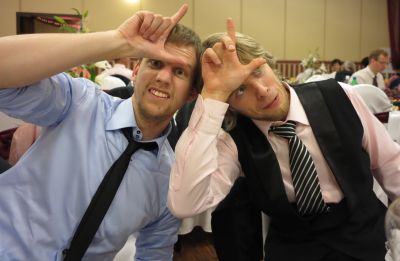 There are three Polish girls, two Italians, a Czech and a Dutch guy. This is not a beginning of a joke, but the people around our international table, in the dance hall of the hotel where the wedding party takes place. In the queue to give the young couple flowers and wine, traditional wedding gifts, we meet our future table mates: a Dutch guy, who calls my friend a bastard because she is not baptized, a Czech guy in a waistcoat, whose name, in a Kundera-style cliché, is Tomáš, and their girlfriends Ania and Ada. Wrong table, definitely. During the first five minutes we toast six times, and the party will last eleven hours more. The girl next to me, who wants to serve everybody the first soup of the evening, tries to help me understand what is going on, without much success. “Na zdrowie” is the only thing I understand and “Nóżki w galarecie” is the only thing I can pronounce. With this vocabulary the only thing I can do is drink jelly.
There are three Polish girls, two Italians, a Czech and a Dutch guy. This is not a beginning of a joke, but the people around our international table, in the dance hall of the hotel where the wedding party takes place. In the queue to give the young couple flowers and wine, traditional wedding gifts, we meet our future table mates: a Dutch guy, who calls my friend a bastard because she is not baptized, a Czech guy in a waistcoat, whose name, in a Kundera-style cliché, is Tomáš, and their girlfriends Ania and Ada. Wrong table, definitely. During the first five minutes we toast six times, and the party will last eleven hours more. The girl next to me, who wants to serve everybody the first soup of the evening, tries to help me understand what is going on, without much success. “Na zdrowie” is the only thing I understand and “Nóżki w galarecie” is the only thing I can pronounce. With this vocabulary the only thing I can do is drink jelly.
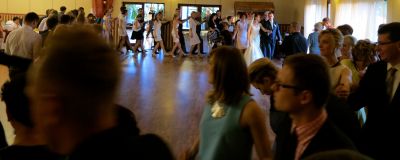 Between a toast and another raises a chorus of “Sto lat, sto lat, nyech zyje, zyje nam!”, a wish of a hundred years of good luck, that we sing crossing our arms together with the people seated beside you. Songs mix with vodka and in the twinkling of an eye we find ourselves singing, pulling each other and standing up and sitting down faster and faster without any clear reason. The band, consisting of a keyboard, saxophone and an electric guitar, starts to play a traditional song and saves me from my thousandth glass of vodka. Everybody is on the dance floor, and after some traditional dance, trying to follow the local customs, I dance too (although more correctly I should say “I move fast”) using unquestionable Travolta moves. The night goes on at a fast pace, continuously alternating vodka, food, dancing, vodka, vodka, nóżki w galarecie, vodka, toasts with vodka, dancing, food, food, vodka, dancing, vodka, vodka, vodka and vodka again. I try to keep up with the locals, but the culture gap is overwhelming. The Dutch guy, an expert in Polish weddings, warned us: “They will force you to drink”. He is the first one who fills up our glasses over and over again. “ I didn’t say who would do that”. With the help of my new Polish friends, I try to drink every toast, in order to honour the tradition.
Between a toast and another raises a chorus of “Sto lat, sto lat, nyech zyje, zyje nam!”, a wish of a hundred years of good luck, that we sing crossing our arms together with the people seated beside you. Songs mix with vodka and in the twinkling of an eye we find ourselves singing, pulling each other and standing up and sitting down faster and faster without any clear reason. The band, consisting of a keyboard, saxophone and an electric guitar, starts to play a traditional song and saves me from my thousandth glass of vodka. Everybody is on the dance floor, and after some traditional dance, trying to follow the local customs, I dance too (although more correctly I should say “I move fast”) using unquestionable Travolta moves. The night goes on at a fast pace, continuously alternating vodka, food, dancing, vodka, vodka, nóżki w galarecie, vodka, toasts with vodka, dancing, food, food, vodka, dancing, vodka, vodka, vodka and vodka again. I try to keep up with the locals, but the culture gap is overwhelming. The Dutch guy, an expert in Polish weddings, warned us: “They will force you to drink”. He is the first one who fills up our glasses over and over again. “ I didn’t say who would do that”. With the help of my new Polish friends, I try to drink every toast, in order to honour the tradition.
If you know the tradition, sometimes you only drink half the glass, they will tell me later. Too late
“If you know the tradition, sometimes you only drink half the glass”, they will tell me later. Too late. From 11:30 pm onwards my memories become more and more fragmented, divided into a series of rapid sketches. First: I am behind the corner of the parking lot outside the hotel, sitting on the ground in front of a car that gives me a disapproving look, my stomach is empty and a guardian angel called Filip is next to me. Second: I refuse a cup of tea which they try to force me to drink, I am sitting on a bench where I remain in awful conditions for more than an hour, or so they say. Third: I am on the sofa in the hall of the hotel, where we took pictures with the married couple. Or so they say. Fourth: I am in the bathroom of my hotel room, sitting in the corner next to the sink (this I remember very well), while Ania and Kasia try to convince me to go to bed, for my own sake. My answer: “I’m fine here”, followed by: “You look taller from down here” discouraged them so much that they decide to leave me alone. Our Dutch table mate is in the same room, in a state of deep coma. A couple of hours earlier, when he left the party to go to bed, I mocked him saying “What a pussy!”. Defeated, I flop down onto the bed next to him.
 When I wake up I’m lying face down on the sheets with my clothes on. It’s 4:33 am and the party ain’t over yet. I get up, I pass by the bed of my Dutch friend, killed in action, and I go to the bathroom. I wash my face and I go downstairs with perfect nonchalance for my triumphal entry to the room, wearing my suit, completely stretched out after two hours of sleep. The bride, fresh and clear-headed with her wedding dress still on ten hours after the beginning of the party, opens her eyes widely and greets me yelling: “You’re alive!”. Filip, my guardian angel, smiles to me, happy that his medicine studies helped me survive the night. During the next round of vodka I treat myself to an elegant cup of tea, that I drink sticking out my pinky. It will end up in the sink.
When I wake up I’m lying face down on the sheets with my clothes on. It’s 4:33 am and the party ain’t over yet. I get up, I pass by the bed of my Dutch friend, killed in action, and I go to the bathroom. I wash my face and I go downstairs with perfect nonchalance for my triumphal entry to the room, wearing my suit, completely stretched out after two hours of sleep. The bride, fresh and clear-headed with her wedding dress still on ten hours after the beginning of the party, opens her eyes widely and greets me yelling: “You’re alive!”. Filip, my guardian angel, smiles to me, happy that his medicine studies helped me survive the night. During the next round of vodka I treat myself to an elegant cup of tea, that I drink sticking out my pinky. It will end up in the sink.
It’s 5:00 am and we’re still dancing, in an amusing and exhausting climax aimed at crushing the last resistance. At 6:00 am there are twenty survivors, immortalized in the traditional picture, among which there are also the parents of the bride, undefeated winners of the party. Among the foreigners the only real survivor is the Czech guy, the only one who stayed up the whole party, having fainted only once at 3:30 am. He spends the last half hour looking at me and thoughtlessly making gestures, midway between ironic and grotesque, to Irene, with whom I exchange quizzical and amused glances. We say goodbye to everyone, we are the last ones to leave the room. To get home we take a taxi driven by a frowning chauffeur as big as the car, so that you cannot easily understand who is driving who. As we are passing by, the Czech guy does not spare us his last obscure and vulgar goodbye, that will make him immortal in our memories. While we are driving on the wet road, I try to decode, with the help of Kasia, the Polish invitation to another party the next day (Yes, there are two parties). This time my intention is to drink less, in order to survive and to remember. All the central parts of today's party – the gift giving, the speech of the bride and the groom, the wedding cake – I will see only in the pictures.
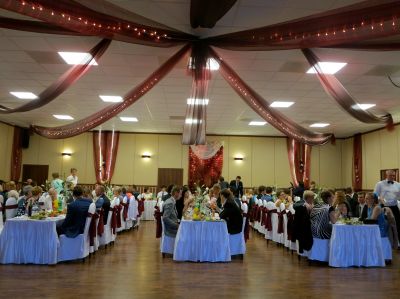 Sunday, midday. I wake up a couple of hours before the others and I go downstairs to the living room, where the householder, Jacek, is waiting for me. “I know what you need”, he tells me in his perfect English. And he comes back with a big can of ice-cold beer. I raise my hands, he is definitely more experienced than I am. I drink it all while we talk about Polish and Italian history. We speak for two hours before leaving for the second party, from 4 to 10. We get there a bit late, because the Pacholik family wants us to taste the so called Italian ice-cream, Lody Włoskie (Yes, the way Poles say “Italian” has nothing to do with the word “Italy”). It is a very good soft serve ice-cream, that they eat the way we eat yoghurt, adding strawberry or chocolate cream. In all probability it is called that because originally the machines used to produce it were Italian. The fact that in Italy Italian ice-cream does not exist creates a moment of confusion.
Sunday, midday. I wake up a couple of hours before the others and I go downstairs to the living room, where the householder, Jacek, is waiting for me. “I know what you need”, he tells me in his perfect English. And he comes back with a big can of ice-cold beer. I raise my hands, he is definitely more experienced than I am. I drink it all while we talk about Polish and Italian history. We speak for two hours before leaving for the second party, from 4 to 10. We get there a bit late, because the Pacholik family wants us to taste the so called Italian ice-cream, Lody Włoskie (Yes, the way Poles say “Italian” has nothing to do with the word “Italy”). It is a very good soft serve ice-cream, that they eat the way we eat yoghurt, adding strawberry or chocolate cream. In all probability it is called that because originally the machines used to produce it were Italian. The fact that in Italy Italian ice-cream does not exist creates a moment of confusion.
In the hotel hall for the second party, less rich than the previous one, two things are not lacking: the indestructible band and the endless bottles of Wiborowa
In the hotel hall for the second party, less rich than the previous one, two things are not lacking: the indestructible band and the endless bottles of Wiborowa. I go easy on the vodka, having learned my lesson. But the band makes us Italians very happy, when they play a Polish-Italian version of Baila Morena and the chicken dance: many people give us puzzled looks when Irene and I start singing the words of the Italian version of the song. The Dutch guy, who has probably just come out from the room where he collapsed, is back to our table. During a break I go get some fresh air on the bench where I sat the night before. On the bench next to mine a girl in orange looks at me and smiles. “Tough weddings in Poland”, I tell her. “Right, I saw you yesterday night”, and she bursts out laughing. Excellent, I think. It is always nice to leave a good impression around the world.
At the end of the second party, on Sunday evening, only few of us are left to clean up the mess after two days of non-stop wedding celebrations, and food and vodka are distributed like there’s no tomorrow. Taking five bottles of vodka as a reward for tolerating us, Kasia asks me and Irene if we want to see wooch’s city centre. Of course we do, we answer. After five minutes we are in the bride’s parents car, packed with meat, cakes, wine, vodka and nóżki w galarecie. They take us close to the city centre, under a pouring rain that follows us until we get to Piotrkowska street, the principal and central street of the city. Moving from pub to pub we pass by the Polish Walk of fame, including, among others, stars like Kieślowski, Wajda and obviously Polanski, while the downpour refuses to leave us in peace. Even the next day, in Modlin’s airport, the rain is still beating down. I get on the plane carrying with me two small bottles of Wiborowa, to remember an unforgettable weekend and to survive the journey. The plane takes off and, leaving the ground, it takes a piece of my heart. All in all, the guy from Turin was right, Polish people’s hospitality will be difficult to forget. The plane slowly flies above the clouds leaving the rain behind and while the white sun seeps through the windows illuminating the surface of the clouds, I think of one thing only. We Italians don’t know anything about weddings.
Thanks to Irene, Anna, Pawel, Filip, Dagmara, Ania, Nico, Tomaš for the amazing time
and special thanks to the Pacholik family, may nóżki w galarecie be with you
Translation Serena Mannucci
Revision Alicja Zajdel
Clicca qui per la versione italiana
Galleria

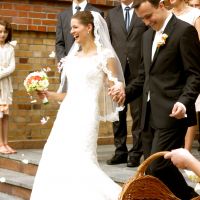
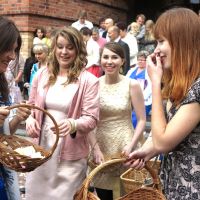

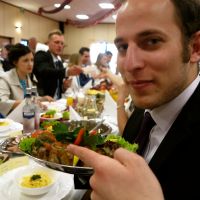


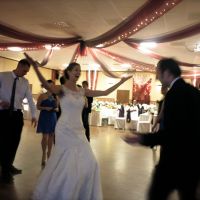

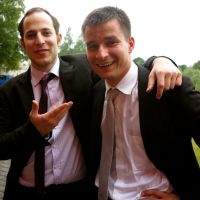
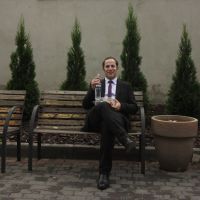

Commenta